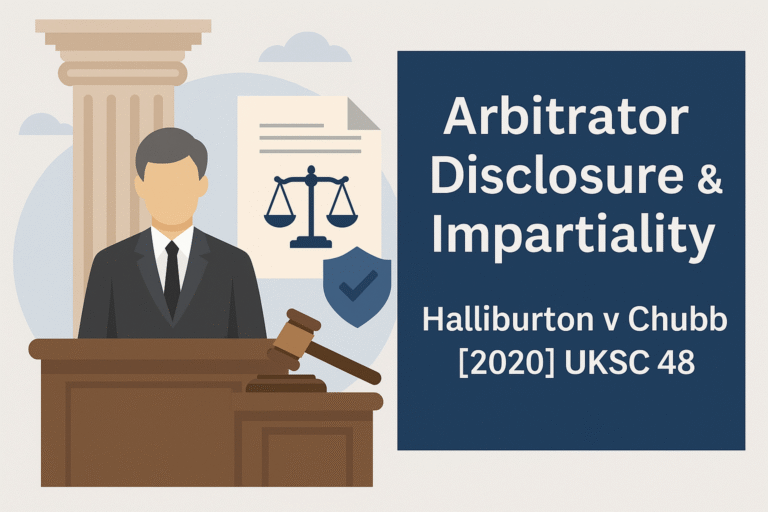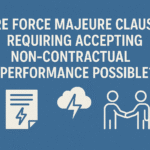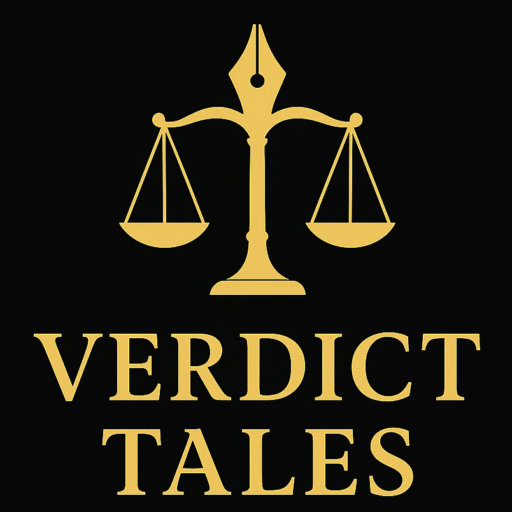Introduction 🏛️
A pillar of arbitration, impartiality guarantees equitable resolution of conflicts. But when should an arbitrator reveal events that would call for questions on their objectivity? The 2020 decision of the UK Supreme Court in Halliburton Company v Chubb Bermuda Insurance Limited ([2020] UKSC 48) offers authoritative direction on this crucial question. With an eye toward the Halliburton case and its ramifications for international arbitration, this blog investigates the legal obligation of arbitrators to disclose such conflicts.
Halliburton v. Chubb: Background 📜
The 2010 Deepwater Horizon accident, which set off several arbitrations under Bermuda Form liability plans, generated the Halliburton lawsuit. In an arbitration, Halliburton sought to enforce a claim against Chubb, its insurance (reference 1). In June 2015 the High Court names Mr. Kenneth Rokison QC as the third arbitrator. Then in December 2015 and August 2016 Rokison accepted appointments in two similar arbitrations (references 2 and 3) involving Chubb and Transocean, another disaster victim, without notifying Halliburton.
Under section 24(1)(a) of the Arbitration Act 1996, Halliburton contested Rokison’s objectivity by claiming that his unreported appointments gave the Arbitration Act’s impression of bias. The matter got before the Supreme Court, which defined the legal obligation of disclosure in arbitration.
Legal Responsibility of Disclosure: ⚖️
In a unanimous ruling released on November 27, 2020, the Supreme Court clarified when an arbitrator should reveal events that would cast reasonable questions about their objectivity. Important ideas comprise:
Arbitrators under section 33 of the Arbitration Act 1996 have core duty of impartiality ([2020] UKSC 48, para 49). Derived from this basic requirement, disclosure is a secondary one meant to guarantee openness and preserve confidence in the system (para 160, Lady Arden).
An arbitrator has a threshold for disclosure: facts or circumstances that would fairly cause a fair-minded and knowledgeable observer to think there is a serious likelihood of bias (paras 108, 131). This is a lower criterion than demonstrating real bias or events that would prove bias.
Context-specific disclosure: The context of the arbitration—including customs and practices in the pertinent field—determines the need for disclosure. For instance, in Bermuda Form arbitrations, several appointments with a common party have to be reported unless the parties agree differently (para 137). On the other hand, industries like marine or commodities arbitration (e.g., GATA, LMAA) might not call for disclosure because of accepted norms of repeated visits (paras 133–135).
Timing of Disclosure: The arbitrator’s knowing circumstances at the time the duty arises determine the prospectively assessed duty (para 119). The work is ongoing; changing conditions might influence its scope (para 120).
Content of Disclosure: Under circumstances like Halliburton, disclosure should incorporate:
The common party’s identify in the associated arbitration.
Whether the appointment comes recommended by a third party or party-appointed.
The fact that the same incidence underlines the arbitration (para 146). Usually, such “high-level” disclosure does not violate confidentiality since the arbitration agreement and field practices allow one to deduce consent (paras 88–104, 184).
Disclosure has to honor the arbitrator’s right to privacy and secrecy. While specific disclosures may need the approval of all parties to the related arbitration, high-level disclosures—e.g., the existence of a related arbitration—usually do not call for express consent (paras 146, 188).
See further information on arbitration concepts: Overview of the Arbitration Act 1996.
In Halliburton v. Chubb 📚
The Supreme Court decided in Halliburton that Rokison had a legal need to reveal his appointment in reference 2 to Halliburton in December 2015 since it related Chubb and overlapped with reference 1 (para 145). The omission to disclose violated his obligation since it would have fairly cast questions on his objectivity at the time (para 147). But during the January 2017 hearing for his removal, other elements—Rokison’s honest response, his clear oversight, and the resolution of references 2 and 3 on preliminary issues—meant the fair-minded observer would not infer there was a substantial danger of bias (para 149). The plea to have Rokison removed was thus turned down (para 158).
Concerning Arbitrators 📌
Arbitrators have precise direction from the Halliburton ruling:
Unless waived by the parties or excused by field-specific procedures, arbitrators must disclose events that would indicate bias, including several appointments with a common party, para 136.
Balancing Confidentiality: While comprehensive disclosures call for approval from all pertinent parties, high-level disclosures are usually allowed without express permission (para 188).
Field-Specific Practices: Disclosure is required without contrary agreement in disciplines such as Bermuda Form arbitration. Conversely, because of typical repeat visits, maritime or commodities arbitrations may not call for disclosure (paras 137, 133).
Timing and Context: Disclosure responsibilities are determined as the situation develops; but, bias is reviewed at the removal hearing, taking all the facts then into account (paras 119, 121).
Notes and Final Thought 🌟
Particularly in cases of several appointments with a similar party, the Halliburton v Chubb ruling emphasizes that arbitrators have to reveal events that might legitimately cast questions about their objectivity. Rooted in section 33 of the Arbitration Act 1996 and the arbitration contract, this obligation guarantees openness while honoring anonymity. The decision customizes disclosure rules to the situation of the arbitration by balancing party liberty with the need of justice.
From What’s Your View?In international arbitration, should disclosure norms be tougher? Comments let you share your ideas. Go to our blog for additional legal insights.
Key Points:
Arbitrators have to reveal events that would point to bias, evaluated in line with the evolving responsibility.
Disclose is required in Bermuda. Unless decided differently, form arbitrations.
While confidentiality limits thorough disclosures, high-level disclosures are usually allowed.
At the removal hearing, bias is determined using all the known facts.
See the whole ruling: Halliburton v Chubb [2020] UKSC 48.




